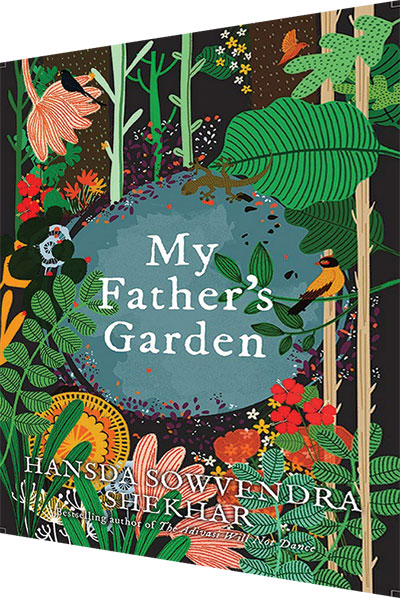 Author of The Mysterious Ailment of Rupi Baskey that won the Sahitya Akademi Yuva Puraskar in 2015 and The Adivasi Will Not Dance (2017) — a collection of short stories banned by the Jharkhand government which also dismissed him from the state medical service in 2017 — Hansda Sowvendra Shekhar’s latest oeuvre is My Father’s Garden. A work of fiction, it tells the story of a young medical practitioner who narrates his life story as he negotiates love and sexuality, the burdens of memory and family expectations. The book is organised into three sections — lover, friend and father — unified by the common narrator.
Author of The Mysterious Ailment of Rupi Baskey that won the Sahitya Akademi Yuva Puraskar in 2015 and The Adivasi Will Not Dance (2017) — a collection of short stories banned by the Jharkhand government which also dismissed him from the state medical service in 2017 — Hansda Sowvendra Shekhar’s latest oeuvre is My Father’s Garden. A work of fiction, it tells the story of a young medical practitioner who narrates his life story as he negotiates love and sexuality, the burdens of memory and family expectations. The book is organised into three sections — lover, friend and father — unified by the common narrator.
The first part explores the narrator’s love life as a homosexual student in a medical school in Jamshedpur. After briefly attending an ordinary degree college in Lucknow, the narrator through his father’s connections, is able to find a berth in the medical school that turns out to be a liberating experience. He finds love with Samir, an ambitious college junior, a companion “hard to find… and one to die for,” according to the narrator who himself found “pleasure in self-abasement”. Through the story, the protagonist is torn between love for, and obedience to his father and a deep sense of guilt as a homosexual, who can never be the son his parents wanted.
The next section ‘friends’ is set in Pakur, a village on the eastern fringe of Jharkhand. The protagonist is posted in a secure government job in Pakur, and strikes up a friendship with Bada Babu — a “rotund, buffoonish head clerk,” at the Sadar Hospital.
Typical of rural India, it is an ill-equipped hospital without even “a functional X-ray machine”. In this small town, the daktar babu rents a home in Madhyapara, a mid-town locality. Daktar babu’s existence is unexciting and the work routine, but the narrative meticulously captures the clout enjoyed by Bada Babu who becomes his self-appointed mentor. As a squatter, he had ‘inherited’ this house and the government job from his mausaji who had adopted him and had died in harness. The charm of this novel is that it realistically evokes small-town life in the backward, rural hinterlands of tribal India heavily influenced by local politics.
The friendship between Bada Babu and the narrator is strange. The author leaves open the question of whether Bada Babu is exploiting daktar babu’s political connections or wants to show him off to his cronies as a close friend who visits his home regularly for meals on Saturday afternoons. But a day after Holi, this community is evicted. The narrator is shocked by the police action of bulldozing the entire settlement, turning it to rubble and dust. Yet the exercise provides him an insight into the realities of vote-bank politics, MLA neta-giri, and underhand deals and commissions, as also new middle class mobility in small town India. This section ends with disillusionment and winding up what had been a useful friendship while it lasted.
The last section from which the book takes its title, is set in Ghatsila, the narrator’s family home where the garden is lovingly nurtured by his father. Here the protagonist recounts the history of the family which begins in Kessorepur, a Santhal (tribal) village in southern Jharkhand. It’s the story of several generations and particularly of his grandfather, the majhi or headman who possessed tracts of land, forests, paddy fields, ponds filled with fish, oxen and had complete authority over the village community. It recounts how as a student, his paternal patriarch resisted discrimination by upper castes in school, organised gangs of Santhal boys to stop the humiliation of Santhali women and spearheaded heroic and inspiring exploits.
The life of tribal communities is not all about preserving an idyllic environment and age old traditions. There are larger issues about fighting entrenched superstitions, lack of education, resistance to social change and general deprivation. By recounting the initiation of the narrator’s grandfather into politics when he joined Jaipal Singh Munda who campaigned for an Adivasi homeland and became the president of the Adivasi Mahasabha in 1939, there emerges a clear-eyed picture of post-independence politics in tribal India where party tickets for fighting elections are issued not on merit, popularity or leadership qualities but on the basis of personal equations with those in power.
The last section presents the failed political career of the narrator’s father who, cheated by his own community has withdrawn into his garden, a refuge likened to the sacred grove or jaher in Santhal villages. Here he finds “the happiness and peace of mind that nothing else could give him”.
The enduring merit of this autobiography, thinly disguised as fiction, is the insights it provides into the socio-cultural and political lives of indigenous communities — Santhals and Adivasis — residing in the interiors of Bihar, and how the interplay between their daily lives and politics resulted in the formation of the essentially tribal state of Jharkhand.
Hansda Sowvendra Shekhar has an easy and unassuming way of voicing dissent and grievances of a community pushed to the margins in post-independence India. His story is a narrative of resistance that will generate public awareness and official displeasure.
Jayati Gupta

























